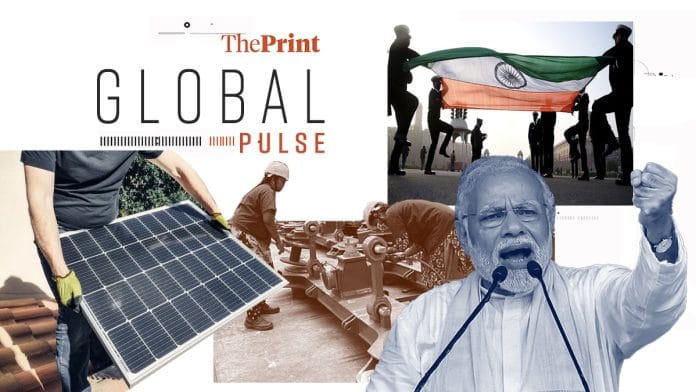New Delhi: One Indian industry, crucial to the nation’s assent as a global power, that has been struck by US President Donald Trump’s tariffs is the solar industry, a report in The New York Times underlines.
For the past several years, India has been trying to become a “clean energy manufacturing hub”—with the US as its biggest export market, reports Somini Sengupta. As the 50% tariff imposed on India by the US comes into effect, solar panels made in India would no longer be an economical option for American consumers, it notes.
“The big question for India now is whether its huge domestic market will be able to absorb its home-grown solar modules. The government has said it wants to be energy self-sufficient, and it has rolled out a raft of incentives to encourage local manufacturing,” says the report. “Solar installers who aim to get government contracts to install rooftop solar for 27 million Indian households have to source locally made equipment.”
The Washington Post also looks at how the tariffs stand to upend Indian industry, along with a diplomatic relationship. “The tariff enactment is creating political headaches for (Prime Minister) Narendra Modi,” write Pranshu Verma and Victoria Bisset.
“Members of Modi’s political opposition have latched onto his inability to procure a deal with Trump as a failure of his foreign policy, which they say is heavier on joint appearances, hugs and scripted events than substantive diplomatic engagement,” says the report, adding a post from Congress president Mallikarjun Kharge on X: “You failed in securing a Trade Deal. Now you are failing to protect our country.”
The Economist touts Narendra Modi as an “economic reformer”.
While India has a number of “unique strengths” on its side, like hordes of untapped talent, domestic market and cheap labour, the article says “its problems are enormous too” and Modi’s successes have been “double-edged”. His fallout with Trump will, in all likelihood, exacerbate several latent issues, which include, according to The Economist, cronyism, welfarism that eats into budgets and the unemployment crisis.
“If India’s relationship with America remains rocky, these underlying problems will be sharpened. The consequences are most obvious for manufacturing,” says the report.
“In Delhi, there had been hopes that India was well-placed to benefit as firms sought to diversify their supply chains away from China. The best example was Apple, which already makes one-fifth of its iPhones in India (electronic goods are exempt from American tariffs). Yet if the tariffs on other goods remain, India will be unable to compete with Bangladesh and Vietnam in areas such as garments and textiles.”
The Guardian profiles India’s first “divorce camp”, founded by 31-year-old Rafia Afi––where women who are divorced, separated, widowed or suffering in their relationships come together as part of a healing retreat.
“Two-day nature-themed retreats, held a few weekends each month, accommodate 15-20 women from different backgrounds and cost upwards of 1,700 rupees (£15), though Afi offers a few free spots for those unable to pay,” says the report.
“According to the most recent National Family Health Survey to be published in India, 32% of married women aged 18-49 reported domestic violence. Women are routinely put under pressure to remain in abusive marriages, even as dowry- and marital violence-related deaths continue to make headlines,” notes the British daily.
(Edited by Nida Fatima Siddiqui)
Also Read: Trump’s shifting stance on tariffs has left India confused; and India’s ‘class of stateless people’






